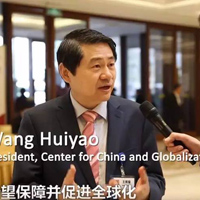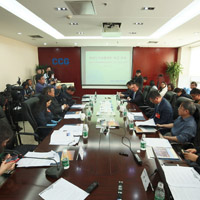- 当前位置:
- 首页>
- 活动>
- ���������������
���������������
CCG持续关注国际关系议题,推动中国与全球化的发展,积极开展国际交流,充分发挥智库“二轨外交”作用,在巴黎和平论坛、达沃斯世界经济论坛、慕尼黑安全会议等重要国际政策与意见交流平台上组织分论坛、边会、圆桌会议、晚宴等活动,促进国际政商学界对话,凝聚共识;CCG积极与各国政界、智库界、工商界开展“二轨外交”活动,每年常态化赴多国调研与交流,促进中外关系攸关方互动,保持与多国政策圈层的沟通渠道。
-
李成:中国GDP增速今年有望好于6.5%
李成,中国与全球化智库(CCG)学术专家委员会专家,美国布鲁金斯学会约翰·桑顿中国中心主任。 布鲁金斯学会是美国久负盛名的智库,李成是布鲁金斯学会约翰·桑顿中国中心百年来首位华裔主任,他的研究方向为中美关系和中国政治,其团队中云集了李侃如等学术政治明星。就刚刚发布的政府工作报告,李成接受21世纪经济报道记者的专访,谈了自己的看法。 《21世纪》:从2017年政府工作报告来看,今年李克强总理将GDP增长目标定在6.5%左右,并强调“在实际工作中争取更好结果”。这略低于去年定的“十三五”增长区间6.5%-7%,以及实际公布的2016年增速6.7%。你如何解读今年这个目标? 李成:谨慎的数字会更好,而且为中国政府留有很多余地,情况好的话,(经济增速的)数字会更高一些。实际上,中国经济在很多方面有很多的起色,尤其在服务业方面,(占比)已经超过了51.5%,这是非常了不起的变化;同时中国的内需在增长,旅游业也在增长,这都是给人信心的表现。 如果内需更快地增长、服务业继续强劲,同时新近毕业的大学生的创新能够更有起色,最终(中国今年的经济增速)的结果要比6.5%好。 我们必须要对大环境有所了解,要对美国和欧盟未来可能产生的对中国经济的冲击做好准备。(美国宣称要对中国征收)45%的关税是完全没有道理的,也会损害美国的利益。同样,英国脱欧、德法选举这些方面有很多未知的因素,这会是中国政府制定经济政策一个考虑的范畴。 《21世纪》:从政府工作报告中所阐明的2017年重点工作任务来看,今年宏观经济调控的重点如何处理调结构和稳增长的关系? 李成:这两方面是相辅相成的。“调”跟“稳”是一个问题的两个方面,不能只强调一个方面而忽视另外一个。当然中国经济的调整是一个长期的过程。现在要保持稳定,同时要保持一定的增长,就业和人口的压力会有所反应。在这种情况下呢,(政策)要不断地随着形势的变化而改变。 城市化进程越来越强,同时环境污染得到遏制的话,那么在这种情况下有增长和投资是可以预期的。但同时如果对环境保护的压力很大,还要加上防止地方债务的问题,防止房地产的泡沫,包括产能过剩的问题都是现实的问题,还有就是资金的外流,所以作为中国政府的金融领导人来讲,这些问题都会摆在他面前,要做些取舍,不是那么容易的事情。 同时,世界上也在发生不确定的事情,这不仅仅是中国的问题,同时也是全世界的问题,在这种情况下,要防止可能出现的一些“黑天鹅事件”事件,就变得越来越重要了。 《21世纪》:关于政府工作报告中提到的国有企业改革措施,您有怎样的分析? 李成:政府工作报告当中第一次用到了“僵尸企业”这一个概念,这在西方也是新的。这也是意味着中国政府解决僵尸企业的问题,这是与国有企业改革相关的。国有企业改革不是说把所有企业的都私有化,而是说把某些国有企业做强做大,另外一些企业可以进行很多结构性的调整,尤其是僵尸企业,要通过《破产法》或其他的机制来改变目前的状况。实际上讲,这也是给私有企业更多的机会和公平的竞争环境。 《21世纪》:李克强总理也提到,在“逆全球化思潮”和“保护主义倾向”下,中国“坚持推进国际贸易和投资自由化便利化”。中国可以在哪些方面为全球化做出贡献? 李成:中国已经在做很多的贡献,包括“一带一路”和亚投行。当然,某些西方国家有些疑问,尤其是美国,但是欧盟、澳大利亚非常热衷于这个变化,更不用说中国的邻国,而且强调基础设施是对的。 美国总统特朗普也在重新制定美国的经济政策,例如减税、将制造业带回美国、重整基础设施,以改变美国的不利状况,但是基建投资离不开劳动力和财力,迟早需要国际合作,需要中国。这也是美中关系值得注意的方面。只有通过合作,才能双赢。美国关起门来做是不行的。所以,他最终一定会调整政策,和中国合作。 《21世纪》:所以美国的门是关不起来的? 李成:我觉得关不起来。文章选自21世纪经济报道,2017年3月11日
2017年3月27日 -

【腾讯视频】聚焦全球化:中国日报外籍记者对话世界经济大佬
3月18日至20日,由国务院发展研究中心主办的2017年中国发展高层论坛在北京召开。中国领导与全球顶尖的CEO、思想家、学者和意见领袖汇聚一堂,苹果CEO蒂姆·库克、美国前财政部长亨利·保尔森、诺贝尔奖获得者(约瑟夫·斯蒂格利茨、阿马蒂亚·森等)受邀参加本次论坛。他们就全球面临的挑战进行探讨,话题涉及世界经济的不确定性、特朗普时代的中美关系、中国的供给侧改革、人类如何应对机器人时代的全面到来等。 中国日报社外籍记者安德鲁·穆迪(Andrew Moody)就与我们生活息息相关的话题,与世界大佬们对话。文章选自腾讯视频,2017年3月21日
2017年3月27日 -

【China Daily】Way ahead
As globalization debate rages, eminent economists at top China forum offer a few pointersChina will deal with financial imbalances in its economy and press ahead with supply-side structural reforms, says He Lifeng, minister of the National Development and Reform Commission.He, who heads the agency responsible for macro-economic management, was addressing the 18th China Development Forum in Beijing, which brings some of the world’s leading experts across a range of fields into contact with China’s leaders.The minister was particularly concerned about money flooding into the property sector and creating asset bubbles. Prices in some major cities, including Beijing, have risen by more than 25 percent over the past year.Vice-Premier Zhang Gaoli delivers a speech on March 18 at the opening session of the three-day China Development Forum in Beijing. Feng Yongbin / China Daily"The excessive capital has resulted in surging housing prices in some key cities and pushed up the costs of the real economy," he said.He also said supply-side reforms were vital and there was a need to cut excess industrial capacity and dispose of loss making "zombie" enterprises if these were to be effective.The forum, sometimes described as the Chinese Davos and which was inaugurated in 2000, again attracted some of the world’s leading thinkers, particularly in economics, with a number of Nobel Prize winners in attendance, as well as chief executive officers of Fortune 500 companies, politicians and academics.Key speakers included Henry Paulson, the US Treasury secretary at the onset of the global financial crisis and author of Dealing With China, and Apple Chief Executive Officer Tim Cook.Topics included the state of the global economy as well as China’s own, China-US relations, supply-side structural reforms, income inequality, innovation and work in the age of robots.The future of globalization with the election of a protectionist and isolationist US president was one of the key areas of concern.With President Xi Jinping delivering a landmark speech at the World Economic Forum in Davos, Switzerland, in January, China is now seen as a key defender of globalization.Stephen Roach, senior fellow at the Yale Jackson Institute for Global Affairs, said Xi was making the speech a normal US president would make."We don’t have a normal US president at present. We have an anti-globalization president. Donald Trump is all about America first. He is not in favor of the multilateral structures that weave the fabric of globalization," he said.Roach, also former chairman of Morgan Stanley Asia, said protectionism should be resisted because it would ultimately be bad for the global economy."Should we defend globalization? The answer is yes, but the question is how. What are the consequences if we get the answer wrong?"The lessons of history - the demise of the first wave of globalization from World War I to World War II - suggest that if we answer the question poorly there are grave and lasting consequences for the whole world."Wang Huiyao, the president of the Center for China and Globalization, China’s largest independent think tank (2nd L).Wang Huiyao, president and founder of the Center for China and Globalization (CCG), a leading independent think tank and a counselor to China’s State Council, agrees that globalization is now under attack."We see when Donald Trump came to office he actually said he preferred bilateralism to globalization," he said."He wants to renegotiate the WTO or NAFTA (the North America Free Trade Arrangement) and actually said he wanted to impose tariffs on China. If every country in the world puts its own country’s interests first and abandons the multilateral mechanisms for trade, it would mean globalization is under serious threat."Joseph Stiglitz, professor of economics at Columbia University. Photos by Liu Hao and Yuan Qingpan / China DailyJoseph Stiglitz, professor of economics at Columbia University and one of the more high-profile figures at the forum, said there were, however, issues with globalization as it currently operates.The Nobel Prize winner said that globalization was under threat from populist movements because it wasn’t delivering for people."Globalization arrangements were designed more for corporate interests than the ordinary workers," he said."So, for example, drug prices would go up. That was not the interest of ordinary individuals. That was in the interest of the drug companies that don’t create jobs, don’t pay taxes and only make political contributions to get what they want."Kaushik Basu, professor of economics at Cornell University and a former chief economist at the World Bank, said the data showed that blue-collar workers in developed countries have been losers in globalization.He said wages as a share of GDP have been on the decline since 1980 in developed countries and even in China since 1995."Since the demand for labor is going down compared with the demand for machinery and other technology, workers are not sharing in the prosperity of the world," he said. "That is why there is a rise in populism."But what Trump advocates is not the right policy response to it," he said. "We have to respond to this populist angst with the right kind of policy intervention."Edmund Phelps, director of the Center on Capitalism and Society at Columbia University who is also a Nobel Prize winner for economics, said he is highly concerned with the loss of jobs and slow growth of wages in the United States."The world of work is under threat and something has to be done to restore positive attitudes about the possibilities of this world and people having meaningful careers and contributing to society," he said."Some think that a job is simply a paycheck and do not understand that a job is a huge chunk of someone’s life and what someone does in their job is very central to their personal and intellectual development."Phelps, author of Mass Flourishing: How Grassroots Innovation Created Jobs, Challenge, and Change, said that there has to be a long-term rethink of the concept of work."People think that if someone doesn’t have work, then it is just fine and all you need to do is throw some money at them. This is crazy."Where now for the global economy? That was a leading topic for discussion at the forum. Nine years after the global financial crisis, growth in many parts of the world remains anemic. The World Bank cut its forecast in January for global growth this year to 2.7 percent, down from its previous 2.8 percent prediction.Larry Summers, the former US Treasury secretary, said it was important not to get too depressed about the state of the global economy, contrasting now to when he was a key figure in the Clinton administration."People around the world are richer. They are living longer, more people are literate, and mortality rates are down In many, many ways the world is a better place than it was 15 years ago and my expectation is that this progress will continue," he said Way aheadSummers, now the Charles W. Eliot University Professor of Harvard University, said many countries had already moved on from the global financial crisis."It has been in the rear-view mirror for some time as far as much of the world is concerned. There are particular strains within the euro system. The real challenge is finding ways to impart significant energy, particularly in the context of the American economy, where secular stagnation has been a problem."Stiglitz said Europe remains the major problem with the debt situation in Greece and Italy, in particular, making global financial markets nervous and contributing to economic uncertainty."Many (European) countries have lower GDP than before the crisis and for many countries, the downturn is much worse than the Great Depression. Unemployment is unacceptably high and youth unemployment in countries like Spain and Greece is as high as 50 percent."There was less concern about the Chinese economy at the forum. Premier Li Keqiang set a target for GDP growth in China of about 6.5 percent when he delivered the Government Work Report on March 5.Jose Vinals, chairman of Standard Chartered, the UK bank with major operations in Asia, said the target was a sensible one for China since it allowed leeway for reform."Accepting lower growth in the short term, but rebalancing the economy with a better policy mix such as less expansionary monetary policy and more expansionary fiscal policy will lead to China having more sustainable growth prospects," he said.Roach at the Yale Jackson Institute for Global Affairs said fears about China had at least eased in the short term."There is less near-term anxiety. The big challenge for China is completing the structural reform agenda that began five years ago, which means rebalancing the economy from manufacturing to services and from exports and investment to private consumption," he said."There has been good progress made in some areas and very limited and disappointing progress in many others. That is a long-term rebalancing that must continue if China is to be strong at home and strong globally."Summers, however, is optimistic the China economy will make the transition whatever the short-term difficulties."China has grown at a remarkable rate and I don’t think that rate is going to be ultimately sustainable. China has some substantial imbalances building up, particularly the accumulation of debt," he said."I am sure the path will not be exactly smooth, but I am also very confident there is good reason to expect Chinese living standards a generation from now will be very substantially higher than they are right now."How to propel supply-side structural reforms in China was the subject of a panel discussion at the forum.Michael Spence, professor of economics at the Stern School of New York University, said achieving success in this area was vital for the China economy."In the longer term if it doesn’t happen, growth will stop," he said."Productivity growth, deepening the capital base of the economy, making it structurally more flexible and doing all the things you need to do to support innovation - all these are tremendously important. While making these reforms, it is important not to forget the demand side of the economy, which in China’s case is important because of the need for consumption," he said.Spence, also a Nobel economist, added that the supply-side reforms are different from those undertaken by the US under Ronald Reagan and in the UK by Margaret Thatcher in the 1980s."If you look at America, there was a macroeconomic management problem. There was inflation but it wasn’t about market dynamism as it is in China. In the UK, Thatcher had to sideline a bunch of fairly obstructive unions to free the labor market and generally make the economy more flexible."Urbanization was another theme of the forum, since increasing standards of living are dependent on more people living in cities.China has had more people living in cities than in rural areas since 2011 when the 50 percent urbanization rate was surpassed.Now 56 percent of China’s population live in cities, and one of the key policy aims of the current Five-Year Plan (2016-20) is to encourage more people to move to urban areas through hukou or house registration system reform.High-income developed countries all have high urbanization rates, with that of the US being 82.4 percent, the UK 79.6 percent, France 85.8 percent and Germany 73.9 percent. Some of the lowest urbanization rates are in Africa, such as in Burundi where only 12 percent of the population live in citiesPaul Romer, chief economist of the World Bank, said urbanization was vital to making people wealthier around the world."China has done a good job on this but it needs to do more. Many countries around the world, have room to bring more people into urban areas. So we need a more inclusive urbanization policy that welcomes everyone that wants to come to cities," he said."You have to say to people that you have a chance to pursue that, if you would like."A number of executives of leading companies who attended the forum remained bullish about the China market despite slowing growth.Tim Cook, chief executive officer of Apple, said it was vital for his company to build a long-term relationship with the world’s second-largest economy.The California-based giant plans to add to its existing bases in Beijing and Shenzhen with two more research and development centers in Shanghai and Suzhou."Look at the talent in China - it is just amazing," he told the forum."We want to broaden our cooperation with China in a deeper way."Roland Berger, the founder and honorary chairman of the global management consultancy of the same name, said China represented a huge opportunity for global business generally."China will be the largest and strongest economy in the world in less than 20 years from now. It is a huge local market with 1.4 billion people speaking the same language. That is more than double the 700 million or so English speakers globally," he said."Although many Chinese businesses have been successful in overseas markets, the debate should be more about foreign companies coming here. We are now seeing a huge number of companies now coming to China, including younger startups, for the opportunities there are here."For now, however, one of the biggest global risks remains China-US economic relations.Former Treasury secretary Summers, who is also a former chief economist of the World Bank, said the actual relationship might be better than some expect."Certainly much of the rhetoric has not been that which I would have chosen or would choose to use when I was in office, but I think ultimately it is going to be the actions that are taken that are going to be more important than what has been said so far," he said.From China Daily,2017-3-24
2017年3月27日 -

【界面】加拿大吸引低龄留学生的原因:教育和社会
留学,在21世纪似乎已经太普遍了。从中国走向世界高等院校的学生比比皆是,在普通百姓家中也越来越平常。而近年来,留学的主力军已然从大学毕业到海外留学转向了小学中学甚至幼稚园。低龄化留学趋势尤其在加拿大的留学生中十分明显,那么,加拿大领跑低龄留学的原因是什么? 2016年底,由中国与全球化智库(Center for China and Globalization,CCG)研究编著、社科院社科文献出版社出版的国际人才蓝皮书《中国留学发展报告(2016)》在北京发布。在这份报告中,中国留学生及留学产业的发展现状与趋势被系统的归纳。其中,留学低龄化、反向留学、留学人员回国就业和创业的主要特点、海归创业、从政意愿成为了重点的讨论方向。报告数据显示,目前,全球有超过500万学生在其祖国以外的国家接受教育,与十年前相比增长了67%,跨国流动程度明显加快。其中,加拿大分了其中大约50万。 加拿大的吸引低龄化留学的原因主要体现在两方面:教育和社会。关于教育 众所周知,加拿大的大学实行统一的公立教育制度,而加拿大的中小学教育确实公立私立全开放,如果你是海外 移民枫叶卡持有者,那么公立中小学可以给你提供优秀教育资源的同时,免去所有的学杂费。而私立学校则倾向于精英化教育,许多有意愿将孩子送往美国英国等更高平台大学的家长尤其会考虑。 其次,加拿大是全世界所有发达国家中对公立教育投入GDP最高的国家。根据统计报告显示,世界发达国家对公立教育投入GDP的平均水平是5.9%,而加拿大是超过7%!当然,国家对于教育的重视不仅体现在国库投入上,同时还有硬件设置的全面。在部分中小学中,弓箭、马术、高尔夫甚至前沿科技都是学校的课程选项,学校尽一切可能给学生一个体验不同世界的机会,这对青少年认识世界以及未来发展有非常重要的影响和推动。 当然,社会因素是另一方面的原因。 首先,加拿大作为全球多元文化最丰富的国家之一,包容来自全世界超过100个国家的大量移民,多元文化的洗礼让这个国家形成了独特的、独立的多元文化。各文化直接和谐相处互相尊重,相比于隔壁邻居美国如今民族情绪的严峻,加拿大显然在民族平等方面做得更加优秀。而这种和谐的社会氛围则让来自海外的青少年更容易容易当地社会,在加拿大,不同肤色不同民族甚至不同语言的人很容易和谐共处。并且,对于青少年和女性的重点保护时刻都是加拿大社会的重要讨论和重视因素。作为家长,也更放心将孩子送到这样一片环境当中接受教育。 其次,安全是另一个非常重要的因素。加拿大令人放心的安全问题分两方面,公共安全和食品安全。作为食品安全评分世界第一的国家,加拿大的食品检测一直是非常严格的实行着。青少年在成长过程中的营养摄取尤其需要重视,而加拿大这一方面的成就无疑促进了留学教育的发展。同时,作为公认的发达国家中低犯罪率的最安全国家之一,加拿大的警方尤其重视保护青少年的人身安全保护,每日的专车校车接送以及相对私密的中小学教学环境解决了青少年留学中父母最担心的安全问题。 最后,整个社会对于教育的重视则是让全球许多国家羡慕和追求的方面之一。加拿大基础教育质量全球高度认可,阅读量高居世界前茅。这其中很重要的原因就是政府投入大量资金建立社区图书馆,鼓励青少年增加阅读了解世界前沿课题。 青少年,在全世界所有国家都被视为国家的未来,如何对待青少年直接体现一个国家如何对待自己的国民。赢得了青少年,自然赢下了国家的未来。文章选自界面,2017年3月20日
2017年3月24日 -

【南方周末】“现在是中国吸引全球人才最好的时候”
从上到下、依左到右分别为:陈十一、王俊峰、张连起、李葳、黄文政。(资料图/图) 2017年3月8日,中国与全球化智库(CCG)会员里的部分全国人大代表和政协委员,齐聚一堂,就司法、财税、人才和生育等问题展开跨界讨论。改进机制吸引全球人才陈十一(全国人大代表、CCG学术专家委员会、专家南方科技大学校长): 中国整体上对人才的吸引力已经很强,但吸引人才的体制和机制还有待改进和加强。 日本、德国、法国和美国,这些年都出台了很多吸引国际人才的政策。中国也有很多政策,但我们在研究环境等软实力方面还不够。 有一次我碰到一个美国斯坦福大学的教授,我问他在斯坦福做学问的秘诀是什么。他说是文化的碰撞,这是中国需要的。 李光耀说过,中国是在13亿人里面选才,美国是在全世界70亿人里选才。现在全世界的保护主义在抬头,去美国没那么容易了。中国成为全世界非常开放的国家。现在正是我们吸引全球人才最好的时候。 现在很多国外教授对中国很有兴趣,比如有以色列教授就跟我说希望来中国发展。加快建立判例数据库王俊峰(全国政协委员、CCG副主席、金杜律师事务所创始人、中华全国律师协会会长): 我希望国家和社会关注如何提高我们的刑辩率。目前中国的刑辩率是比较低的,律师主要是在职务犯罪案件中参与度比较高,因为职务犯罪人群的法律意识都很高。但更多当事人的合法权益需要律师参与进来。正如习近平总书记讲的,要让每一个案件都能感受到公平和正义。 现在中国有大概32.8万律师,未来中国需要更多律师,尤其是年轻律师。中国在搞“一带一路”建设,有很多企业到海外去了,需要用法律手段维护自己的权益。 随着互联网科技的发展,大数据等工具被应用到法律领域。中国在短短一两年里,就把数以亿计的判例整合到数据库里。只需要几秒钟,就能把所有类似判例调出来查阅。 所以,在高科技时代,我们的法律进步可能实现弯道超车和跨越式发展,我们判决的公正性会大大提高。 还有一件值得大家关注的事是民法总则的修改,对每个人的意义非常重大。这是我们拥有民法典的重要一步。中国从新中国成立初期就开始讨论制定民法典,直到十八大以后才开始加速。加大减税降费力度张连起(全国政协委员、CCG特邀高级研究员、北京大学经济学博士): 今年政府减税和降费的力度将更大,其中减税3500亿元,降费2000亿元。降费难度非常大。什么叫费?是国务院各个部门自己设的,都有道理。比如说绿化的、水利的、环保的。当然都对,但这么多有道理的费加在一块,企业难以承受,不堪重负。 2000亿元的目标看起来虽然整体规模不算大,但考验着包括国务院各个部门和各个地方政府。尤其是经济发展较弱的地方,收费冲动更明显。 个税改革这块,会有突破,中等收入者的税负要降低。但这个有难度,需要税收征管系统的改革,以及个人信息系统的完善。但总方向是定了的,要给中等收入者减负,在纳税时扣除他们的二孩、基本房贷和再教育等支出。希望全面放开和鼓励生育李葳(全国政协常委、全国政协委员、广东省侨联副主席): 我建议尽快出台全面放开和鼓励生育的政策,越快越好。黄文政(CCG高级研究员): 很有幸认识李葳,协助他起草一些提案。中国生育率在上世纪90年代初已经降到了很低水平。当时的出生率的数据是1.23,大家不信这个数据。2010年普查出来的结果发现,出生率非常低。现在总算全面二孩放开了,2017年可能是生育高峰,大概1850多万。2018年以后就会减少。 另外就是要改革《收养法》。目前中国的收养制度非常严格,主要是为了堵住计划生育的漏洞。所以哪怕你再富有,条件再好,如果你有孩子,就不允许收养。现在的《收养法》带来很多问题,首先是弃婴现象非常严重,建议适时修改。文章选自《南方周末》,2017年3月11日
2017年3月24日 -
徐小平:让乐观主义成为我们的信仰!
理事简介徐小平 , 中国与全球化智库(CCG)副主席,真格基金创始人。徐小平道:“我虽然不懂投资,但我热爱年轻人、相信梦想、信任创业者。当一个年轻创业者走过来向我展示他哪些雄心勃勃想法的时候,我总是情不自禁地想要跳上他的创业大车,一起驰向未来。” 三月的三亚阳光明媚,徐小平老师再一次“放飞了自我”。 3月3日,由清科集团、投资界主办的2017年投资界百人论坛在海南三亚万豪酒店举行,百位投资界巨匠深度剖析2017年投资趋势和策略。这次徐小平带来的主题演讲是创投事业与时代精神,他先回应李开复:“我不是人工智能,我是拥有七情六欲的徐小平。”并表示,“投资人与创业者的原动力就是乐观主义精神…我们要用这种乐观主义精神从创投界渗透到全社会,成为时代的精神和信仰!”以下为对话实录: 首先声明我是徐小平,不是人工智能,我只有人工,没有智能。 2011年,我参加了清科集团第一届三亚论坛。在这个论坛上,我与刘强东、汪潮涌、倪正东同台对话,没过几年京东就上市了,创造了中国新经济又一个了不起的里程碑。参会后我留在了海南,在两个星期之内完成了《中国合伙人》的剧本初稿。也算是中国创业电影的里程碑吧。三亚论坛给我留下了很难忘的回忆。 说到人工智能这个话题,前两天开复在一次演讲中提到,“哪些领域不需要七情六欲的机器人,人工智能就有取代人类工作的可能。比如扫地机器人、工业机器人、老人陪伴。” 也许开复不需要有七情六欲的机器人,但是我老了以后需要机器人陪护时,我觉得我这个机器人有感情,进行陪护、对话、吵架等等。如果机器人能够给人类带来温暖和幸福感,不是很好吗? 人工智能是我们脚下的未来。这使我想起著名企业家、登山家黄怒波的一句诗,他在登上珠穆朗玛峰之后写道“满天的繁星,我代表人类向你问好!”我现在想说,“未来,我代表创投圈的朋友们,代表今天的人类向你问好!无论未来有多远,我们都会把你拥抱,因为我们将会长生不老!”长生不老这样的人类终极梦想很可能就在我们这一代实现。这是多么令人激动的未来!作为投资人、创业者,我们每一天都在为未来构想、设计并建构新的可能。 自从10年前开始做天使投资以来,我一直在思考一个问题:生命有限的我们,如何能做一些无限的事?我做投资是为了什么,是为了追求财富、荣誉、成功、实现自我,还是另有什么更加崇高的价值? 马斯洛人类需求五层次理论大家都知道,从下到上依次是:生理需求、安全需求、社交需求、尊重需求和自我实现需求。大家有没有注意到,投资人往往是获得了财富、事业、社会认同和自我实现之后,才开始做投资;绝大部分创业者也不是因为没有前途、走投无路才去创业,真正优秀的创业者都是在职场上已经做得出类拔萃的人。按照马斯洛的需求理论来看,他们已经实现了自我。投资人把一笔一笔的钱投出去,创业者把自己的前途押注于完全未知的世界,是为了实现怎样的价值呢? 创业与投资,我们为何在此,在此又为何呢? 回顾我自己的投资实践,我可能是中国投资项目最多的天使投资人。江湖上关于我投资的各种传说都有。甚至说我不懂投资,“瞎特么投”,但是就是这种“瞎特么投”,投出了中国最优秀的金钱回报。我虽然不懂投资,但我热爱年轻人、相信梦想、信任创业者。当一个年轻创业者走过来向我展示他哪些雄心勃勃想法的时候,我总是情不自禁地想要跳上他的创业大车,一起驰向未来。 每一笔钱给出去,我都觉得,天哪,又一个独角兽诞生了!当然第二天醒过来的时候我又会觉得“蓝瘦香菇”,又一个100万就这么没了。 我愿意给这些年轻人投资,是因为我相信他们能够创造未来,能够凭借自己的聪明才智获得成功和自我实现,我相信他们的才华。在这一切的“相信”的核心,是我内心深处一种强大的精神力量,这就是乐观主义精神。 什么是乐观主义?Wikipedia上有一个经典的定义,就是:“悲观主义者看到的杯子是半空的,而乐观主义者看到的杯子是半满的。”悲观主义者看到一个项目,认为全是风险,投资进去必然血本无归。乐观主义者看到一个项目,认为虽然有风险,但是日后必然能涨到100亿美金! 有人说,你是因为有钱了,不怕赔钱,才能保持乐观主义。其实不然。在我穷困潦倒的时候,我也是不折不扣的乐观主义者。1990年初,我在国内创业创业失败,回到了加拿大温哥华。在去打零工的路上,我会从温哥华富人区一栋栋豪宅之间穿梭而过,许多豪宅的门口有显示家族姓名的牌子。那时是我人生的最低谷,但每每从这些豪宅经过的时候,我内心都涌动起一股喜悦的情绪。因为我觉得这些房子都是我的。我会觉得那些房子的门牌上挂着“Xu”两个字母。看到别人的成功与财富我从不沮丧,我总觉得是我的。这种感觉,让我在最失败的岁月都能为那种“可能性”感到由衷的幸福!这不是不可救药的“乐观主义”是什么! 现在,我每天醒来,都想着,今天又会有一只独角兽出现在我的门口,尽管来的大部分是跛脚鸭。但是等待独角兽出现的这种心灵深处的欢乐,驱使着我在投资界跟朋友们度过了十年,我想再度过很多个十年,直到永恒。 毫无疑问,每个成功的投资人都是乐观主义精神的实践者。投资人与创业者的原动力就是乐观主义精神。在座的各位你们想一想,你投资成功的项目,赚了大钱的项目,哪一个不是在别人放弃的时候,你坚信成功得到的?你极其遗憾的项目,哪个不是在你对它的怀疑和忧虑中而一次次错过?乐观主义是照亮你成功的乐园的阳光,悲观主义是造成你失败废墟的台风。乐观主义精神是创投界共同的驱动力,共同的精神阳光,它一直深藏在我们心中,把我们的心智照亮。 这种乐观主义精神不仅仅是对一个项目的乐观,对于一个行业的乐观,更是对于一个社会、对于一个国家的乐观。乐观主义精神应该成为创投百人会、投资界、创业群体、中国双创事业所形成的一种社会共识,所共享的一道精神底线。 在特朗普刚刚发表的首次国情咨文中,他说了这么一段话:“ 美国伟大的新篇章现在开始了,一股新的民族自豪感正在我们国家蔓延,新的乐观情绪激增,把不可能的梦想牢牢掌握在我们的掌握之中。我们今天目睹的是美国精神的复兴。” 美国是个极富乐观主义精神的国家。19世纪的著名政治社会学家、历史学家托克维尔是这么描述美国人的:“美国人坚信人是可以逐渐趋向完美的,他们全都认为社会作为一个整体正在不断地提升。” 一家著名的研究机构Pew Research Center在2014年做了一个调查,随机问一些普通人,今天是格外美好的一天吗?在美国,有高达40%的受访者回答是肯定的,远高于其他富裕的欧洲国家比如德国(21%),英国(27%)。美国歌手Louis Armstrong那首“What a wonderful world多么美妙的世界”这首歌广为传唱,几乎获得了国歌一般的地位。 在中国,认为今天是格外美好的一天的受访者,只占18%。但为什么这个数字不能是40%,甚至60%呢?我们就应该自信地说,“中国伟大的新篇章现在开始了,一股新的民族自豪感正在我们国家蔓延,新的乐观情绪激增,把不可能的梦想牢牢掌握在我们的掌握之中”? 我们就应该这样描述我们的国家:“中国人民坚信:人是不断趋向完美的,我们全都认为社会作为一个整体,正在不断地提升”!中华民族就应该拥有这种乐观主义精神!如果别人不这样讲,我们投资人、创业者是不是应该有一种勇气和激情来说出这样的话?我们在每一次创业,每一次投资的时候,都表达着对中国未来坚定的信念,是我们自身对于整体家国的未来,表达出的乐观以及再一次的肯定。 尽管生活有这样那样的问题,我们也有这样那样的期盼,社会有很多要进一步完善之处,但看到中国这40年来的变化,我们心中应该有坚定不移的乐观主义精神。我们应该让这种乐观主义精神成为新时代的主旋律,驱动我们在实践中用自己的努力,让中国变得越来越好。 1995年12月底,俞敏洪来到了温哥华。之前在北大的时候,我挣120块钱工资,俞敏洪才挣70块。但是他来看我的时候,已经通过创业新东方实现了成了千万富翁,实现了财富自由。而我经历了创业失败,正在一个加拿大移民事务所做着打字员的工作。老友相逢,深夜长聊。我跟他说,敏洪,你现在才30出头,但是你什么都拥有了,你还缺什么呢?俞敏洪谦卑地沉吟半晌说:小平,我感觉我还缺一点崇高感…… 我们每个人都在寻找生命的崇高感。那创业者和投资人的崇高使命是什么呢?作为最具有乐观主义精神的这样一群人,我认为我们的使命是,让这种乐观精神感染、影响、照亮全社会。让创投界开始的这一场静悄悄的乐观主义精神的生长,蔓延到全国的各个角落,不仅在创投界引领我们前行,而是成为一种时代精神,成为一种全新的信念和信仰。 用我们对自身命运和中国未来的乐观主义信仰,去感染其他人使他们对个人命运和国家未来的充满了信心。让每个中国人每天醒来的时候能够由衷地说一句,这是多么美好的一天,这是多么美妙的时代!文章选自投资界,2017年3月4日
2017年3月24日 -
施一公做客学术之道 诠释科学家的素质
专家简介施一公,中国与全球化智库(CCG)学术专家委员会专家,清华大学副校长。 “科学研究中如何脱颖而出”,是施一公此次报告的核心。在妙语连珠的演讲中,施一公详细回顾了自己求学与科研20余年的历程,并分享了很多自己在学习、研究和教学方面的经验与感悟。 施一公开门见山地指出,兴趣是科学研究的前提,无论是对于具有书生气质的人,还是事先做好为学术献身的人,抑或觉得科学很神圣、可望不可及的人,科学研究要有一种浓厚的兴趣做驱使,否则,研究就是一种压力。他表示:“在良好的老师指导下,多数人都可以做学术,当然,有时候机会来的很巧合,也很偶然。” 谈及自己与学术结缘的经历,施一公回忆起在清华大学学习生物学以及之后在国外读博士、博士后的故事。他坦言,自己最初的理想是经商,直到认真审视自己内心,发现人生志趣并不在成名或者赚钱,而是期冀一种全身心的投入,无怨无悔的探求未知领域。他说:“我希望为人类发展留下一些印记,可以不虚有此生。我觉得唯一提供这个机会的,就是做一名科学家。科学家的目的是探索未知,把未知转化为已知,只有这样,历史才会记住你。”至于为何选择了生物学,施一公笑言:“生命科学是21世纪的科学。” 结合自己在科研历程中的体会,施一公分析了拔尖创新学生应有的素质,即勤于付出时间、敢于挑战权威,以及“做一个有脾气的人”。 “所有成功的科学家一定具有的共同点,就是他们必须付出大量的时间和心血。这是一条真理。实际上,无论社会上哪一种职业,要想成为本行业中的佼佼者,都必须付出比常人多的时间。”施一公说,“不要相信所谓的‘运气’,运气是自己创造的,而不是等来的,运气好坏和时间付出成正比。” 想要在科学研究上取得突破,仅仅刻苦地付出时间是不够的,还需要有批判性思维(critical thinking),即敢于挑战学术权威和学术成果的勇气,而不单单是简单的接受、消化和吸收。 “科学家应该是有脾气的。”在施一公看来,“内圆外方”很难做出重要的研究成果,能够成才的人应该是“外圆内方”,既能顺应外界与人融洽相处,又能有自己的个性,坚持自身观点。 不宁唯是,施一公特别强调坚持的重要性。他认为,所有的成功都源于坚持。即便在学术上抓住了很好的机遇,取得了一些建树,但也需有持之以恒的决心和毅力,而不是受到打击时,觉得自己会被摧毁。施一公鼓励在座学生:“对学术事业而言,孜孜以求非常重要,只要你们横下心来,决定做大事并且为之努力,一定有一天,清华会为你们骄傲。但切勿今日信誓旦旦,明天却知足常乐不思进取。” 施一公再三激励同学们牢记自己肩负的历史责任,坚持冲劲和理想,为中国科学研究的发展和民族复兴贡献自己的力量。 施一公还从方法论切入,讲述了科学研究的三个重要因素,即技术、问题和系统,施一公进一步阐释,技术是科学研究的工具,对刚入门的研究者尤其重要,但其相对重要性逐年减少,对绝大多数科学家而言,必须根据研究的需要选择技术,而不是根据技术选择研究。问题是科学研究的推动力,每个人都知道提问题的重要性,但多数人不知道如何提出问题。事实上,提问题的关键,在于把“无序”变为“有序”。系统是研究的载体,常常被很多人忽视,如果将问题比喻为引擎,技术是细节与装修,那么系统就是运输工具。如何建立适合课题研究的系统,需要不断思考和探索。文章选自清华大学新闻网,2014年5月
2017年3月24日